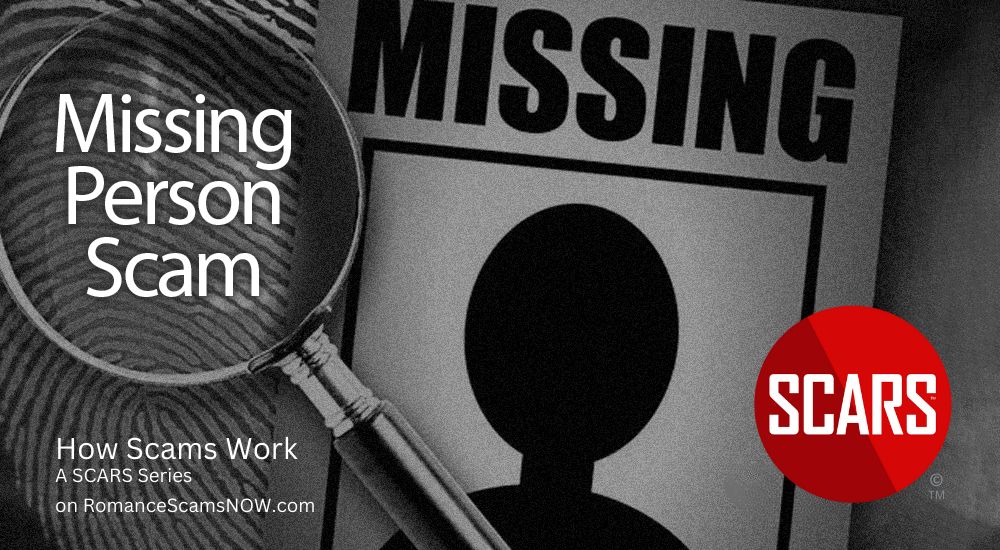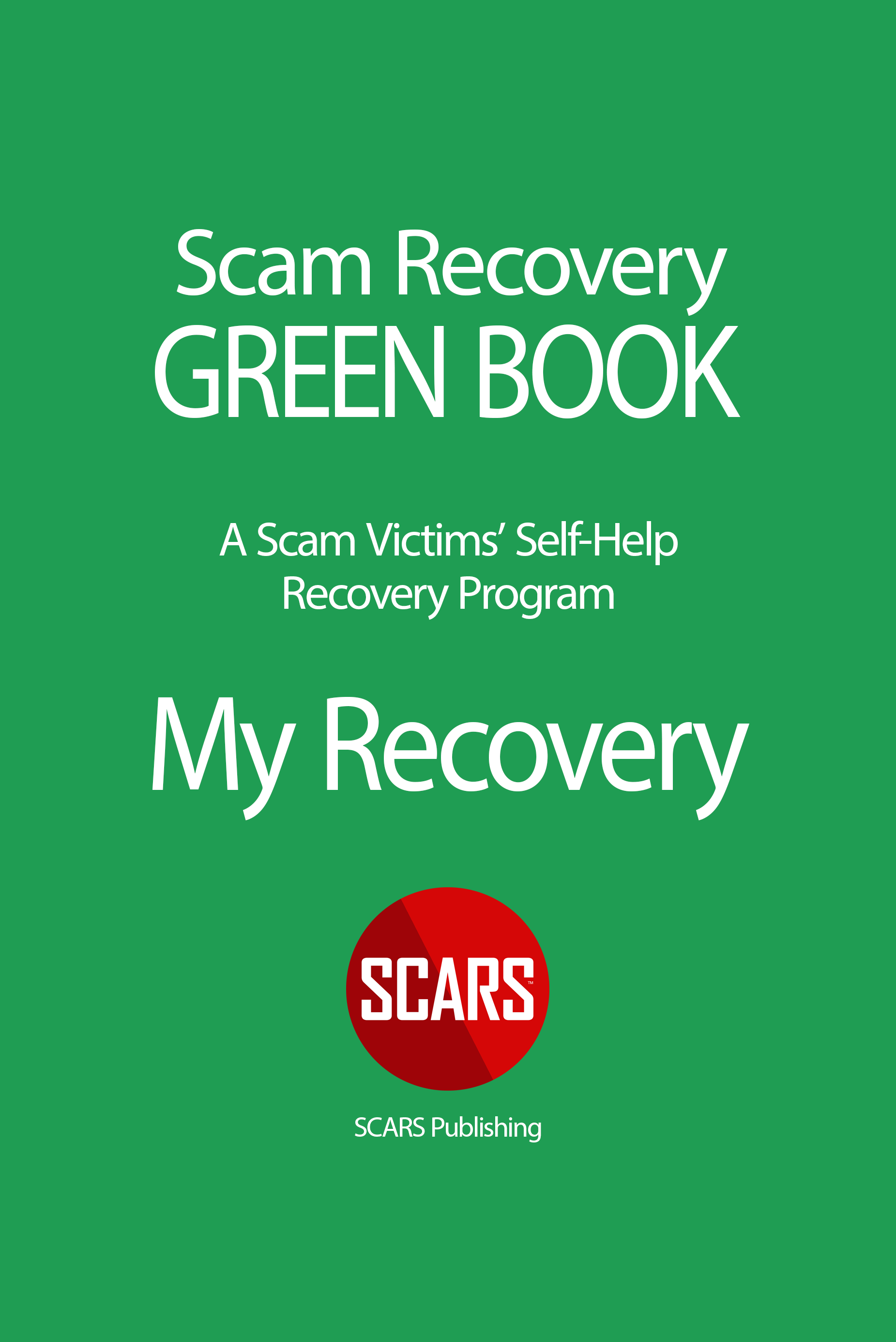Missing Person Extortion Phone Scam
A Phone Scam Targeting the Families of Missing Persons
How Scams Work – A SCARS Insight
Author:.
• Tim McGuinness, Ph.D. – Anthropologist, Scientist, Director of the Society of Citizens Against Relationship Scams Inc.
Originally Published: 2021 – Article Updated: 2024
Article Abstract
The phone extortion scam targets families who post missing person notices on social media. Scammers research these posts to gather details about the missing person and their family, then use third-party calling apps to demand ransoms ranging from $1,000 to $10,000, with $7,000 being common.
They often claim the missing person is ill or injured to add urgency. To guard against this scam, families should verify the authenticity of such demands through law enforcement, keep all communication records, and report the crime to authorities. Awareness and caution in sharing personal details online can help prevent falling victim to this exploitative scheme.

Phone Extortion Scam/Fraud – Targeting the Parents or Family of Missing Persons for Money
A Scam where Scammers Target Families Who Post Missing Person Notices on Social Media
You see missing person notices every day on Facebook or other social media platforms. A family member posts that their teenager has disappeared or a senior parent has not returned from a trip out of the house. The goal, of course, is to crowdsource the missing person’s recovery. This scam targets them!
Here’s where the fraudster can come in: after identifying a missing person on social media, scammers research details of the disappearance, the missing person, and the missing person’s family. The scammers often obtain telephone numbers for the family members on social media and use third-party calling or messaging apps to call to make ransom demands.
The demand usually ranges from $5,000 to $10,000, with $7,000 being a common amount. Generally, offenders do not offer proof of life, although there is at least one instance where the scammer called the family pretending to be the victim. Offenders often claim the missing person is ill or injured, adding to the urgency of the situation and putting additional pressure on family members to pay the ransom.
Warning
SCARS and the FBI warns the public of scammers seeking to extort family members of missing persons. These actors identify missing persons through social media posts and gather information about the missing person and their family to legitimize their ransom demands without ever having physical contact with the missing person.
What Is A Missing Person Extortion Scam
The FBI defines this type of extortion as a range of phone scams for extorting quick ransom payments from the families of missing persons who are manipulated to believe their loved one has been abducted, is at risk of being abducted, or is in imminent danger.
However, this means it can also come through the phone, email, messaging, or other means.
How Does A Missing Persons Extortion Scam Work?
It is common for scammers of this type of scam to only request small amounts of money as missing person scams tend to be a quick cash-grab – from $1,000 to $10,000 typically. In addition to small requests, scammers tend to express a high level of urgency in the payment by claiming the victim is either injured or sick.
In August 2020, a scammer targeted a mother who reported her 13-year-old daughter as missing on social media. The mother posted information on social media seeking assistance; however, that information was eventually used against her. Included in the online post was the mother’s personal phone number. According to the FBI’s Internet Crimes Complaint Center, scammers took advantage of this by calling the mother, claiming they had her daughter and required some ransom for her safe return. In the past, scammers have used this pressure tactic to demand ransom sums ranging from $5,000 to $10,000. Thankfully, the 13-year-old daughter had never actually been abducted and safely returned home before the scammers could capitalize on the family’s concern.
Scammer Method
While scammers’ use of social media to target victims of all types is well known, its use to extort vulnerable families of missing persons is lesser-known.
After identifying a missing person on social media, scammers research details of the disappearance, the missing person, and the missing person’s family. The scammers often obtain telephone numbers for the family members on social media and use third-party calling or messaging applications to make ransom or extortion demands to disguise their true telephone numbers. The criminal actor generally requests between $5,000 and $10,000 in ransom, with $7,000 being the average requested.
These scammers use social media or networks to identify, initiate contact, and gain access to families of missing persons. The offenders usually do not offer proof of life. However, in one instance, an accomplice made telephone calls to family members claiming to be the missing person. Offenders often claim the missing person is ill or injured, adding to the urgency of the situation and putting additional pressure on family members to pay the ransom. Today with deep fake technology, someone’s voice is easy to reproduce.
Over the past several years, law enforcement has received large numbers of reports of scammers targeting families who have posted on social media about their missing family members.
More Examples
In May 2020, a father reported his son missing to law enforcement. The child’s family created social media posts seeking assistance in locating their child, after which the child’s father received a text message demanding ransom.
In May 2018, a family reported an 18-year-old woman as missing. Local media reported the disappearance and family members posted a request for information on her disappearance to social media, along with a personal telephone number. Individuals claiming to have abducted the woman contacted the family telephonically at the provided personal number. One of the scammers claimed to be the victim and spoke to family members, saying they were drugged, threatened with physical assault, and taken to another state. Subsequent investigation revealed the missing woman was never abducted and was eventually found unharmed.
How Can Families Protect Themselves
Although these scams provide an initial wave of hope to the victim’s families, it is recommended to approach these online encounters with caution and let law enforcement handle the situation.
If you are the target or victim of an extortion attempt related to a missing person:
- Contact your local law enforcement agency or your local FBI field office – contact information can be found at (www.fbi.gov) immediately, just like any other kidnapping or ransom crime
- Keep all original documentation, emails, text messages, and logs of communication with the subjects. Do not delete anything before law enforcement is able to review it
- Tell law enforcement everything about the encounters—it may be embarrassing for the parent or partner of a missing person, but it is necessary to find the offenders. When reporting online scams, be as descriptive as possible in the complaint form by providing:
- Name and/or user name of the subject
email addresses and telephone numbers used by the subject - Web sites used by the subject
- Description of all interactions with the subjects
- Name and/or user name of the subject
- Report this crime to the FBI first by phone, then other the FTC & Anyscam.com when it is determined to be a scam
To learn more about reporting see below in the SCARS Resources list.
Important Information for New Scam Victims
- Please visit www.ScamVictimsSupport.org – a SCARS Website for New Scam Victims & Sextortion Victims
- Enroll in FREE SCARS Scam Survivor’s School now at www.SCARSeducation.org
- Please visit www.ScamPsychology.org – to more fully understand the psychological concepts involved in scams and scam victim recovery
If you are looking for local trauma counselors please visit counseling.AgainstScams.org or join SCARS for our counseling/therapy benefit: membership.AgainstScams.org
If you need to speak with someone now, you can dial 988 or find phone numbers for crisis hotlines all around the world here: www.opencounseling.com/suicide-hotlines
More How Scams Work:
- Missing Persons Money Scam – How Scam Work – 2024 (romancescamsnow.com)
- How Scams Work (romancescamsnow.com)
- Google Voice Scam – How Scams Work (romancescamsnow.com)
- The Spanish Prisoner Scam – How Scams Work (romancescamsnow.com)
- Business & Personal Gift Card Scams – Don’t Pay For Anything With A Gift Card – How Scams Work! (romancescamsnow.com)
- Police Impersonation Scam Phone Calls – How Scams Work (romancescamsnow.com)
- The Refugee Romance Scam – How Scams Work (romancescamsnow.com)
- Jobs Scams & Employment Scams – How Scams Work (romancescamsnow.com)
-/ 30 /-












Leave A Comment